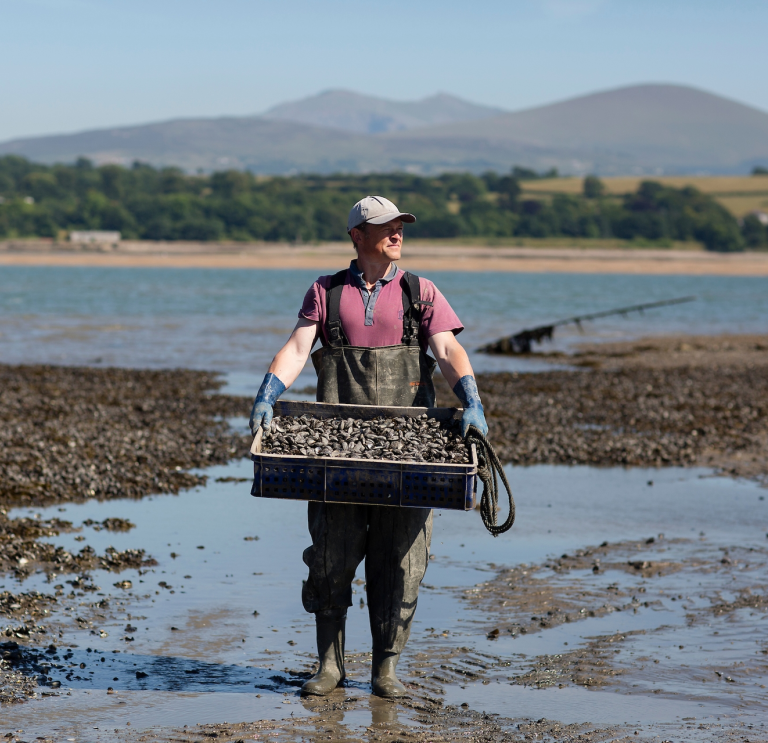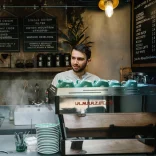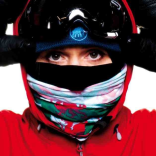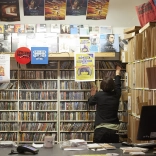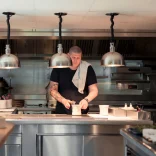I'm living the tropical dream… on Anglesey
I went to Bangor University and did a degree in marine biology, and then a Masters in shellfish with the idea of going to some far-flung tropical idyll to run some form of aquaculture farm. That didn't quite pan out. I knew a chap who was growing oysters here on the Menai Strait; he didn’t want to carry on, so he sold me his farm and I developed it from there.

We grow oysters and mussels from seed
We buy what's known as seed oysters, and we cultivate them in bags on steel racks. As the oysters grow we thin them out just like seedlings in a pot. We get them at just under a gram and we can turn out a 100-gram oyster in as little as 12 months, but to get a really good harvest you're talking 18 to 24 months. For the mussels we rely on wild captured seed, taken from areas where natural settlement occurs, but they're not suitable for growing the mussels on - storms would come in and sweep them off. So we go out with a small vessel and harvest up the baby mussel seeds and re-lay them on the farm. It takes two to three years for those to get to market size.
In my job, you don't need to go to the gym
We harvest by hand. For the last 20-odd years, a rope and a tray is the pinnacle of technology. I've tried many things, but it turns out that pure physical graft is the best way of doing it. I haven't done any formal exercise since I left university a quarter of a century ago, and I've still got the same waist size. Most people who come and work for me will lose a stone in a week or two. A lad who's worked for me for a few years has taken up rugby again as a result of towing these trays. He became their player of the season.



There's a special knack for walking in mud
A ton of mussels will produce 17 tons of mud every year, so if you've got 50 tons of mussels that's nearly 800 tons of mud. You develop skills of how to negotiate mud. People without that technique spend most of their time stuck and floundering around. I've had quite a few television personalities completely stuck in the mud to the point we've had to dig them out.

You have ideas as you're working
You don't have to use much brain power when you’re picking the shellfish, so it gives you time to think. I'm always thinking how could I improve it and make it easier. I've designed and built my own purification systems which clean the shellfish prior to human consumption. I've developed my own system and devised my own grading machines, and I’m familiarising myself with a new machine with the mussel harvesting.
Menai Strait gives a unique flavour to shellfish
We have some algae that blooms here called phaeocystis which imparts a lovely sweet flavour into the shellfish. It's just the way the whole system works: the algae comes in from Amlwch and Red Wharf Bay and gets funnelled through the Menai Strait. With the currents, there's a constant flow of food-bearing water over the shells.


The key to quality is doing everything in-house
I farm it, I clean it, I purify it, I pack it and I deliver it. I control all aspects, so I know my customer is getting the best I could possibly give them. Oysters have a phenomenal shelf life if treated properly, so we can send them further afield than the mussels. My son is training to be a chef and worked at the Dorchester in London, where Alain Ducasse was using my oysters in his restaurant. And I got the feedback that Alain Roux said my oysters were fantastic. I also supply shellfish to three restaurants on Anglesey – Dylans, The Marram Grass and Catch 22 in Valley. It's nice they're sourcing straight from the farm.
I'm trying to de-plasticise my entire packing line
The oyster side is quite easy, because traditionally they're always packed in wooden punnets, but on the mussel side everything's done in plastic. It's cheap and does the job, but then you have the legacy of plastic that's unrecyclable so it just ends up in landfill. My outer sack is now made from potato starch and the inner net is from woven cotton. If I can get 98% of my business plastic-free I'll have done well.

I don’t mind sharing with the wildlife
It's a special area of conservation, so we’re mindful of the wildlife we get here. An intertidal mussel bed is a food provider for marine and terrestrial organisms, so it's a diverse community. We've got 40 or 50 oystercatchers here permanently, and in winter we can get up to 300 transient birds. But if you're farming properly, the mussels are either too small for them to bother with, or they're too damned tough. The smartest bird is the crow. They don't bother pecking the mussels open like oystercatchers; they use gravity. They pick a mussel up and fly it over the road and drop it.
The food we produce here is excellent
It's not just the shellfish, but in general the quality of food production on Anglesey is really good. We've also got a fantastic natural environment, there's no heavy industry, we're still all about open green spaces and fantastic views. You could be sailing in the Menai Strait in the morning and hiking up to the top of Snowdon in the afternoon. I rely on a nice clean environment to produce quality shellfish. I'm of the opinion that we're custodians rather than owners. When I'm long dead and buried my beach will still be there, looking exactly the same as it is today.

